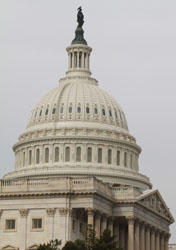After wrangling for weeks over how to finance a Medicare “doc fix,” House and Senate conferees have a plan.

Photo by Jessica Marcy/KHN
The proposal would cut Medicare payments to hospitals and other providers for “bad debt,” Medicare payments to clinical laboratories and Medicaid “disproportionate share” payments to hospitals that serve many poor patients, and divert $5 billion from the health law’s $15 billion prevention fund.
In addition, Louisiana would not receive $2.5 billion in additional Medicaid funds included in the health law, according to a GOP aide. Critics of that provision had dubbed the money “the Louisiana purchase,” but it was defended by Sen. Mary Landrieu, D-La.
Those funds would be used to stop a scheduled 27 percent payment cut to Medicare physicians for the rest of the year, according to a tentative House-Senate conference deal that Congress is expected to consider this week. The “doc fix” is contained in a larger package designed to extend the current payroll tax holiday through the end of the year and provide additional financial assistance to the unemployed. If there is enough support in both chambers, Congress could approve the package by the end of this week before heading out of town for the weeklong President’s Day recess.
A summary circulating Wednesday notes that cuts to health law funding comprise a large portion of the savings funding the Medicare spending in the agreement. The package would cost about $50 billion over the next decade, with about $20 billion going towards the Medicare doc fix and Medicare extenders package.
The negotiators plan to take $9.6 billion from areas that include payment cuts for clinical laboratory services and Medicare “bad debt,” payments Medicare makes to hospitals and nursing homes when patients cannot pay for their medical care. The tentative deal would reduce Medicaid “disproportionate share” payments to hospitals by more than $4 billion.
Concerning a package of Medicare policies known as “extenders,” the tentative deal would eliminate two – additional payments for mental-health services and a health law provision to increase payment for bone density scans. Two other extenders, one dealing with paying more to some rural hospitals to help cover high labor costs and another to allow independent laboratories to receive payments for the technical component of certain pathology services, would be phased out, giving providers time to adapt, according to the tentative deal. The package also “extends and reforms” Medicare’s current cap exception for physical, speech pathology and occupational therapy, which allows eligible beneficiaries to get additional services, “by requiring…accountability, which will eliminate wasteful spending,” according to the summary.
Additional Medicare payments for ambulance services, as well as a policy to base supplemental payments for Medicare physicians based on geographic factors and to provide more Medicare money to certain rural hospitals with 100 or fewer beds would all be extended. The agreement calls for the Government Accountability Office, the Medicare Payment Advisory Commission and the Centers for Medicare and Medicaid Services “to report to Congress on their effectiveness and ways to greater protect taxpayer dollars.”
American Medical Association President Peter W. Carmel, M.D. said that while doctors were pleased the deal would stop a reimbursement cut set to begin March 1, the package “represents a serious missed opportunity to permanently replace the flawed Medicare physician payment formula and protect access to care for military families and seniors.”






